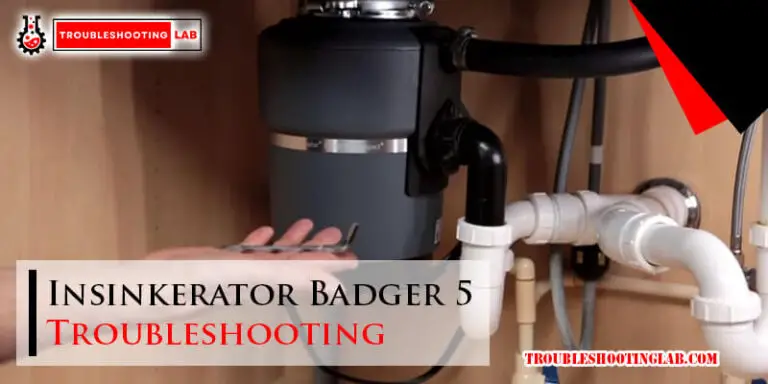Safe-T-Alert RV Propane Gas Detector Troubleshooting
The Safe-T-Alert RV Propane Gas Detector is a crucial safety device designed to alert RV owners of potentially hazardous propane leaks. However, like any electronic device, it may encounter issues over time. Troubleshooting these problems is essential to ensure the continued safety of occupants and the proper functioning of the detector. From false alarms to sensor malfunctions, understanding common troubleshooting steps can help RV owners quickly address and resolve issues. In this guide, we’ll explore some common problems that may arise with the Safe-T-Alert RV Propane Gas Detector and provide solutions to troubleshoot them effectively.

Understanding Rv Propane Gas Detectors
What Is An RV Propane Gas Detector?
An RV propane gas detector is a crucial safety device installed in recreational vehicles to detect and alert occupants of any propane gas leaks or elevated levels of carbon monoxide. It is designed to monitor the air quality inside the RV and emit an audible alarm if it detects any dangerous levels of these gases.
How Does An Rv Propane Gas Detector Work?
RV propane gas detectors work using advanced sensor technology, typically utilizing a combination of electrochemical, semiconductor, or infrared sensors to detect the presence of propane gas or carbon monoxide. These sensors continually monitor the air quality within the RV, and if they detect dangerous levels of these gases, they trigger a loud audible alarm to alert the occupants.
The Importance Of A Functioning Propane Gas Detector In Your RV
An RV propane gas detector plays a critical role in ensuring the safety of occupants while on the road or enjoying camping trips. Here’s why:
- Early detection of leaks: A functioning propane gas detector can immediately detect even small leaks in the RV’s propane system. This early detection helps prevent potentially hazardous situations, such as gas buildup or explosions.
- Protection against carbon monoxide: Carbon monoxide is an odorless and colorless gas produced by the incomplete combustion of fuels. A functioning propane gas detector can detect elevated levels of carbon monoxide and act as an early warning system, protecting occupants from this silent killer.
- Peace of mind: Knowing that you have a reliable propane gas detector in your RV provides peace of mind, allowing you to enjoy your travels and camping adventures with confidence.
- Legal compliance: In many jurisdictions, having a functioning propane gas detector installed in an RV is a legal requirement. Ensuring your detector is in good working order helps you comply with regulations.
Regular maintenance and troubleshooting of your RV propane gas detector are essential to ensure its proper functioning and reliability. By familiarizing yourself with the troubleshooting techniques and following the manufacturer’s guidelines, you can address any issues promptly and keep your propane gas detector operating optimally.
Common Issues With RV Propane Gas Detectors
If you own an RV, it’s crucial to have a functioning propane gas detector to ensure the safety of you and your loved ones. However, like any electronic device, RV propane gas detectors can face common issues that may affect their performance. In this section, we will discuss some of the common issues and troubleshooting tips to help you address them promptly and effectively.
False Alarms And Why They Occur
False alarms with RV propane gas detectors can be frustrating and may occur due to various reasons. Here are a few common causes:
- Dirty Propane Detector: Accumulation of pet hair, dust, or debris can trigger false alarms by interfering with the detector’s sensors. Regular cleaning can help prevent this issue.
- Expired Propane Sensor: Propane gas detectors have a limited lifespan, typically around 5-7 years. An expired sensor may emit an end-of-life alarm with a different beep pattern. If your detector is old, it might be time for a replacement.
- Loss of Power: Low batteries in the RV can lead to a loss of power, causing the alarm to produce a slow beep. Ensure your batteries are charged and replace them if necessary.
Maintenance And Cleaning Tips For Rv Propane Gas Detectors
Regular maintenance and cleaning can help prevent false alarms and ensure the proper functioning of your RV propane gas detector. Here are a few tips to keep in mind:
- Keep the Detector Clean: Use a soft cloth or brush to remove any dust, pet hair, or debris that may accumulate on the detector’s surface or vents. Avoid using harsh chemicals or solvents that could damage the sensors.
- Test the Detector: Regularly test your propane gas detector using the manufacturer’s recommended method. This will ensure that it is functioning correctly and can detect any potential gas leaks.
- Replace Expired Sensors: If your propane gas detector is approaching its expiration date, consider replacing the sensor proactively to ensure accurate readings and reliable performance.
Signs That Indicate Your Rv Propane Gas Detector May Need Replacement
While regular maintenance can extend the lifespan of your RV propane gas detector, there are some signs that indicate it may be time for a replacement. Look out for the following:
- Frequent False Alarms: If your propane gas detector consistently triggers false alarms, even after cleaning and maintenance, it may be a sign of a malfunctioning sensor and requires replacement.
- Visible Damage: Inspect the detector for any visible damage, such as cracks, discoloration, or loose wiring. These signs may indicate internal issues that cannot be resolved through simple troubleshooting.
- Expired Lifespan: As mentioned earlier, RV propane gas detectors have a limited lifespan. If your detector is well beyond its expected lifespan, it’s prudent to replace it to ensure continued safety on the road.
By addressing common issues promptly and following proper maintenance practices, you can ensure that your RV propane gas detector functions optimally and provides reliable protection during your travels.
Introducing Safe-t-alert

Safe-T-Alert is a reliable and efficient propane gas detector that ensures the safety of your RV. Designed specifically for recreational vehicles, the Safe-T-Alert propane gas detector is equipped with advanced technology to detect the presence of propane gas and provide early warnings in case of leaks or malfunctions. With its easy installation and user-friendly interface, this propane gas detector is a must-have for any RV owner.
Overview Of The Safe-t-alert Propane Gas Detector
The Safe-T-Alert propane gas detector is a state-of-the-art device that offers unparalleled safety features for RV owners. Here are some key points to know about this exceptional product:
- Provides accurate and reliable detection of propane gas leaks for enhanced safety.
- Equipped with advanced sensors that can quickly detect even the slightest presence of propane gas.
- Offers both visual and audible alarms to alert occupants of potential dangers.
- Its compact and lightweight design makes it easy to install in any RV.
- Comes with a long-lasting battery life to ensure continuous protection.
Key Features And Benefits Of Safe-t-alert
The Safe-T-Alert propane gas detector is packed with features that make it an indispensable tool for RV owners. Let’s take a look at some of its key features and benefits:
| Key Features | Benefits |
|---|---|
| Built-in microprocessor | Allows for accurate and reliable detection of propane gas leaks. |
| Easy-to-read display panel | Provides clear and instant information on gas levels and alarm status. |
| Multiple alarm modes | Ensures occupants are alerted through both visual and audible alarms. |
| Long-lasting battery life | Gives peace of mind with continuous protection without the hassle of frequent battery replacements. |
| Simple installation process | Allows for quick and easy setup without the need for professional assistance. |
How Safe-t-alert Can Help Troubleshoot Common Issues With RV Propane Gas Detectors
When it comes to troubleshooting common issues with RV propane gas detectors, Safe-T-Alert goes above and beyond. Here’s how Safe-T-Alert can help you overcome these common problems:
- Dirty propane detector: With the accumulation of pet hair, dust, and debris, RV propane gas detectors can become dirty and less effective. Safe-T-Alert provides easy-to-follow cleaning instructions to ensure the detector remains in optimal condition.
- Expired propane sensor: An expired propane sensor may emit an end-of-life alarm that has a different beep. Safe-T-Alert offers replacement sensors and detailed instructions on how to properly replace them.
- Loss of power in the RV: Low batteries can cause the alarm to produce a slow beep. Safe-T-Alert provides guidance on how to check the battery voltage and replace it if necessary.
With its user-friendly manual and comprehensive support, Safe-T-Alert is committed to helping you troubleshoot any issues that may arise with your RV propane gas detector. Trust in Safe-T-Alert to keep you and your loved ones safe on your RV adventures.
Troubleshooting Steps With Safe-t-alert
Do you troubleshoot the Safe-T-Alert RV Propane Gas Detector? In this section, we will walk you through the troubleshooting steps you can take to address any issues with your Safe-T-Alert propane gas detector. By following these steps, you can ensure that your detector is functioning properly and providing the safety you need while on the road.
Step 1: Checking Power Supply And Batteries
The first step in troubleshooting your Safe-T-Alert RV Propane Gas Detector is to check the power supply and batteries. Here’s how you can do it:
- Make sure your RV is connected to a power source or that your generator is running, as the gas detector requires power to function. Check the power supply to ensure it is functioning properly.
- Inspect the detector’s batteries. If they are low or dead, replace them with fresh batteries. It is recommended to use high-quality batteries to ensure optimal performance.
- Check for any loose connections or corroded terminals in the battery compartment. Clean them, if necessary, and ensure a secure connection.
- Once you have checked the power supply and batteries, test the detector to see if the issue has been resolved.
Step 2: Cleaning And Maintaining The Safe-t-alert Propane Gas Detector
To ensure the proper functioning of your Safe-T-Alert propane gas detector, regular cleaning and maintenance are essential. Follow these steps to clean and maintain your detector:
- Disconnect the power supply to the detector before cleaning.
- Use a soft cloth or brush to remove any dust, pet hair, or debris that may have accumulated on the detector’s surface or vents. Pay attention to the sensor area, as dirt or debris can affect its accuracy.
- For stubborn stains or residue, use a mild, non-abrasive cleaner and a soft cloth. Avoid using harsh chemicals or abrasive materials that could damage the detector.
- Allow the detector to air dry completely before reconnecting the power supply.
- Regularly check the detector for any signs of wear or damage. If you notice any cracks, discoloration, or other issues, consider replacing the detector.
Step 3: Resetting The Safe-t-alert Propane Gas Detector
If your Safe-T-Alert propane gas detector is displaying unusual behavior or not functioning properly, a reset may be necessary. Follow these steps to reset the detector:
- Disconnect the power supply to the detector.
- Locate the reset button on the detector. It is usually located on the front or side of the unit.
- Press and hold the reset button for a few seconds until you hear a beep or see the indicator lights flashing.
- Release the reset button and wait for the detector to go through its initialization process.
- Once the initialization is complete, reconnect the power supply and test the detector to see if the issue has been resolved.
Step 4: Replacing The Safe-t-alert Propane Gas Detector If Necessary
If none of the troubleshooting steps mentioned above resolve the issue with your Safe-T-Alert propane gas detector, it may be time to consider replacing it. Here are some indications that it may be necessary to replace the detector:
- If the detector is old and nearing the end of its recommended lifespan. Refer to the manufacturer’s guidelines for the expected lifespan of your specific model.
- If the detector has been damaged or shows signs of wear and tear that could affect its performance.
- If you have followed all the troubleshooting steps and the detector still does not function as expected.
When replacing the Safe-T-Alert propane gas detector, ensure that you choose a compatible model and follow the installation instructions provided by the manufacturer.
By following these troubleshooting steps, you can address common issues with your Safe-T-Alert RV Propane Gas Detector and ensure the safety of your RV. Remember to always prioritize safety and consult the manufacturer’s manual for specific instructions related to your detector model.
Ensuring Safety With Safe-t-alert
Safe-T-Alert RV Propane Gas Detector plays a crucial role in keeping you and your loved ones safe while on the road. This reliable device constantly monitors the propane levels inside your RV and alerts you in case of any leaks or malfunctions. To ensure maximum protection, it is important to regularly test and maintain your Safe-T-Alert detector. Understanding the different alarm sounds and their meanings is key to identifying potential issues. Additionally, following a few simple tips can help you maintain a safe propane system in your RV. Let’s dive deeper into each of these topics.
Importance Of Regular Testing And Maintenance
Regular testing and maintenance of your Safe-T-Alert RV Propane Gas Detector are crucial to its effectiveness. By implementing a routine testing schedule, you can ensure that the detector is functioning properly and providing accurate readings. Testing should be done at least once a month and before embarking on a trip. Here are the steps to test your Safe-T-Alert detector:
- Press and hold the test button on the front of the detector.
- Listen for the alarm sound and observe the LED indicators.
- If the alarm sounds and the LED indicators function correctly, your detector is working properly.
- If the alarm does not sound or the LED indicators do not activate, it may indicate a malfunction, and professional assistance may be required.
In addition to regular testing, it is essential to perform routine maintenance. Clean the detector regularly using a soft, dry cloth to remove any dust or debris that may accumulate. Ensure that the detector is properly mounted and that the sensor is not obstructed. Verify the expiration date of the detector and replace it if necessary. By following these maintenance practices, you can maximize the lifespan of your Safe-T-Alert RV Propane Gas Detector and ensure its reliable operation.
Understanding The Different Alarm Sounds And Their Meanings
The Safe-T-Alert RV Propane Gas Detector produces different alarm sounds depending on the situation. Understanding these sounds can help you identify the cause of the alarm and take appropriate action. Here are the three common alarm sounds and their meanings:
| Alarm Sound | Meaning |
|---|---|
| Continuous beeping | Indicates the presence of propane gas. Evacuate the area immediately and shut off the propane supply. |
| Intermittent beeping | Signals a low battery or end-of-life warning. Replace the batteries or the entire detector, depending on the model. |
| Rapid beeping | Indicates a fault or malfunction in the detector. Consult the user manual or contact a professional for assistance. |
By familiarizing yourself with these alarm sounds, you can quickly respond to potential gas leaks or detector issues, ensuring the safety of everyone inside your RV.
Tips For Maintaining A Safe Propane System In Your RV
In addition to relying on the Safe-T-Alert RV Propane Gas Detector, there are several steps you can take to maintain a safe propane system in your RV. Follow these tips to minimize the risk of gas leaks and ensure the overall safety of your RV:
- Regularly inspect the propane lines and connections for any signs of damage or wear. Replace any worn-out parts immediately.
- Ensure proper ventilation in the area where your propane system is located.
- Install a carbon monoxide detector alongside your propane gas detector for comprehensive safety monitoring.
- Keep flammable items away from your propane system and practice safe storage of propane cylinders.
- Adhere to proper propane refilling and handling procedures. If in doubt, consult a professional.
By following these tips and regularly maintaining your propane system, you can enjoy peace of mind knowing that you have taken all necessary precautions to keep your RV and everyone inside it safe.
Frequently Asked Questions

Why Does My RV Propane Detector Keep Going Off?
Your RV propane detector may keep going off due to a dirty detector with pet hair, dust, or debris. Additionally, an expired propane sensor may emit an end-of-life alarm with a different beep. Loss of power in the RV due to low batteries can also cause the alarm to produce a slow beep.
Why Is My Safe T Alert RV Propane Gas Detector Flashing Red And Green?
The flashing red and green on your Safe T Alert RV propane gas detector indicates a malfunction. Check for pet hair, dust, or debris that may be obstructing the sensor. If that doesn’t solve the issue, replace the expired propane sensor or ensure the RV has enough battery power.
How Do You Test A Safe T Alert RV Propane Gas Detector?
To test a Safe T Alert RV propane gas detector: 1. Disable the propane alarm. 2. Use various substances like Bio-Freeze, Lysol Spray, and Clorox Wipes to test the detector. 3. Check for any false alarms or unusual behavior. 4. Replace the detector if necessary. 5. Ensure the alarm is functioning properly for your safety.
How Do I Reset My RV Co Detector?
To reset your RV CO detector, follow these steps: 1. Locate the reset button on the detector. 2. Press and hold the reset button for 10-15 seconds. 3. Release the button and wait for the detector to reset. 4. Test the detector to ensure it is functioning properly.
Why Is My Rv Propane Detector Going Off?
Your RV propane detector could be going off due to a dirty detector with pet hair, dust, or debris. It could also be due to an expired propane sensor or low batteries causing a loss of power in the RV.
Conclusion
Troubleshooting your Safe-T-Alert RV Propane Gas Detector is crucial to ensure the safety of your RV and its occupants. By following the steps provided in this blog post, such as checking for debris and pet hair, replacing expired sensors, and testing the detector, you can prevent false alarms and address any issues that may arise.
Remember to keep your propane gas detector in optimal condition for peace of mind during your RV adventures.





